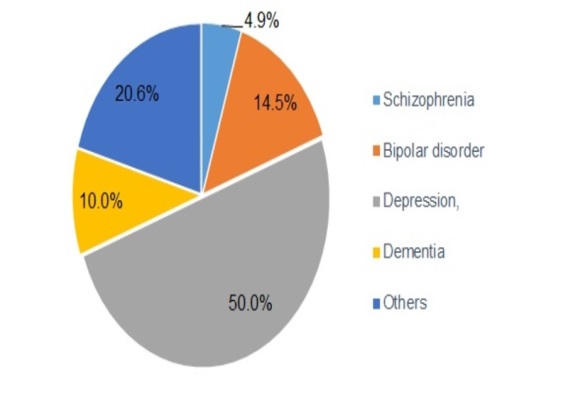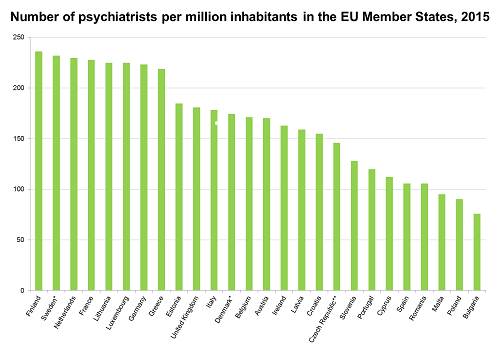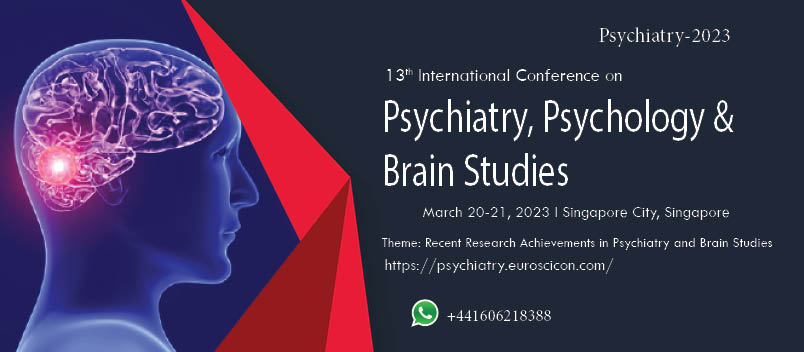PSYCHIATRY 2023
ABOUT CONFERENCE
The EuroSciCon meeting on the Psychiatry 2023 spotlight on developments and the conceivable fate of Psychiatry from March 20-21, 2023 in Singapore City, Singapore. The subject of the back and forth movement year's party is "Recent Research Achievements in Psychiatry" which will give an overall stage to discuss present and future difficulties in different sort of mental and cerebrum explore the issue, Psychiatry bearing, proceeding with getting ready and limit meeting. World-driving thriving authorities, clinicians, instructors, and specialists will demonstrate front line and sensible clinical methods in the context of completely perceived affirmation and will indicate new and make the examination.
ABOUT SUBJECT
Psychiatry is the branch of drug concentrated on the conclusion, treatment and anticipation of mental, passionate and conduct issue. A therapist is a restorative pro who speaks to impressive expert in mental prosperity, including substance, uses jumbles. Specialists have met all necessities to overview both the psychological and physical parts of mental issues.
Brain science is the study of the psyche and conduct. "Psychology" originates from the Greek word mind signifying "breathe, soul, soul", and the Greek word logia meaning the investigation of something. The brain is very unpredictable and baffling. Many think about how therapists can concentrate such a mind boggling, apparently theoretical and to a great degree complex thing. For an analyst, human conduct is utilized as proof - or if nothing else a sign - of how the mind capacities. We can't watch the brain specifically; in any case, for all intents and purposes the entirety of our activities, emotions and contemplations are affected by the working of our psyches. That is the reason human conduct is utilized as crude information for testing mental hypothesis on how the mind capacities.
WHO CAN ATTEND?
- Psychiatrists
- Psychologists
- Physicians
- Specialists
- Researchers
- Health care professionals
- Professors
- Industrial Experts
- Neuropsychiatrists
- Mental health Nurses
- Nutritional Scientists
- Lecturers and Students from Academia
SESSIONS &TRACKS
Psychiatry is the branch of remedial concentrated on the discovering, treatment and evasion of mental, eager and conducts issue. A therapist is a restorative master who speaks to significant specialist in mental prosperity, including substance uses jumbles.Specialists are met all necessities to study both the psychological and physical parts of mental issues. Psychiatry is by and by an extremely detectable activity, nonappearance of care in the gathering, drive, suicide, drug and alcohol misuse are couple of motivations. Starting with the conspicuous evidence of the major enthusiastic insecurities and how they are thought about refinement from conventionality.
SUBTRACKS
- Cultural Psychiatry
- Liaison Psychiatry
- Organizational Psychiatry
Brain research is the science worried about lead, in both human and nonhuman animals. Not with standing its adolescence, it is a wide instruct, essentially spreading over point from science to humanism. A Psychotherapist is a specialist who surveys and considers direct and mental techniques. Examiners have doctoral degrees. They think the merging of two fundamental associations: one between cerebrum limit and direct, and another between the earth and lead. As scientists, investigators take after sensible systems, using careful discernment, experimentation and examination. In any case, clinicians also ought to be imaginative in the manner in which they apply legitimate revelations.
SUBTRACKS
- Abnormal Psychology
- Anomalistic Psychology
- Behavioural Psychology
- Biological Psychology
Post-Traumatic Stress Disorder is a confusion that creates in a few people who have encountered a stunning, unnerving, or hazardous occasion. It is normal to feel perplexed amid and after a horrible circumstance. Dread triggers many split-second changes in the body to help shield against peril or to keep away from it. This "battle or-flight" reaction is a run of the mill response intended to shield a man from hurt. Almost everybody will encounter a scope of responses after injury, yet the vast majority recuperate from introductory side effects normally. The individuals who keep on experiencing issues might be determined to have PTSD. Individuals who have PTSD may feel pushed or startled not withstanding when they are not in threat.
SUBTRACKS
- Normal Stress Response
- Acute Stress Disorder
- Uncomplicated PTSD
- Comorbid PTSD
- Complex PTSD
Enthusiastic prosperity jumbles join aggravations in considering, feeling, and direct. Little disturbing effects in these parts of life are customary, yet when such aggravations burden the individual through and through and moreover meddle with well-ordered life, they are viewed as energetic instability or a psychological prosperity issue. The impacts of pointless lead might be brief or solid. These wrecks are caused by complex facilitated endeavours between physical, mental, social, and gained impacts. Mental cures are for the most part proposed by essential care authority. In any case the best and best treatment for a psychological well-being concern is from an excited success able: a star, clinician, clinical social labourer or psychotherapist. For a couple of patients, a mix of psychotherapy and pharmaceutical is overall represented, the best framework for treatment.
SUBTRACKS
- Autism Spectrum
- Development Disability
- Substance Use Epidemiology
Rest apnea is a genuine rest issue that happens when a man's breathing is hindered amid rest. Individuals with untreated rest apnea quit breathing over and again amid their rest, once in a while several times. This implies the cerebrum and whatever remains of the body may not get enough oxygen.
SUBTRACKS
- Obstructive Sleep Apnea
- Central Sleep Apnea
- Nocturia
- Insomnia
Disarranges everything considered at first dissected in Infancy, Childhood, or Adolescence including mental Retardation, Learning Disorders, Motor Skills Disorders, Communication Disorders, Pervasive Development Disorders which Fails youth to give close thought with respect to subtle sections and displays indiscreet oversights moreover successfully controlled by inconsequential shocks. Kid and Adolescent Psychiatrists are by all record not using any and all means the just a single, in any case, as the national fundamental for youth and pre-grown-up social experts, instructive masters, and clinicians is almost as remarkable.
SUBTRACKS
- Lifespan Development
- Child, Adolescent, And Family Assessment
- Intervention Strategies
Brain research of the elderly ones instigate Nero or cerebrum issue to more settled people. The particular quality is every so often hinted as geriatric psychiatry, position psychiatry or psychogeriatric. The amount of occupants in old (and particularly exceptionally old) people is extending rapidly all through the made and making countries. This reflects improving achievement and social conditions and is a purpose for the get-together. More settled people remain in extraordinary mental and furthermore physicalflourishing and continue adding to their families and to society. Some eager flimsiness, (for instance, the dementias) are particularly ordinary in status; others isolate in clinical areas and also, show particular issues in the affiliation. Social weights, arranged physical issues, and material needs are other than standard.
SUBTRACKS
- Generalized Anxiety Disorder
- Obsessive Compulsive Disorder
- Panic Disorder
A psychological issue likewise called a dysfunctional behaviour or mental issue is a social or mental example that causes critical trouble or debilitation of individual working. Such highlights might be determined, backsliding and transmitting, or happen as a solitary scene. Numerous clutters have been depicted, with signs and indications that shift broadly among particular issue. Such clutters might be analysed by a psychological wellness proficient.
The reasons for mental scatters are frequently vague. Speculations may consolidate discoveries from a scope of fields. Mentalclutters are generally characterized by a mix of how a man carries on, feels, sees, or considers. This might be related with specific locales or elements of the mind, frequently in a social setting. A psychological issue is one part of emotional wellness. Social and religious convictions, and social standards, ought to be considered when making a determination.
SUBTRACKS
- Borderline Personality Disorder
- Bipolar Disorder
- Suicide Prevention
Addictive clutters, for instance, substance mishandle and reliance, are normal issue that incorporate the manhandle of liquor or medications. Enslavement creates after some time and is a perpetual and losing the faith sickness. Addictive diseminates are caused by numerous components, including natural stressors, innate safety, social weights, solitary character qualities and mental issues.
SUBTRACKS
- Addiction
- Substance Use Disorder
- Impulse Control Disorders And Addictions
- Alcoholism Addiction
Measurable brain research is the convergence amongst brain research and the equity framework. It includes understanding key legitimate standards, especially as to master witness declaration and the particular substance zone of concern, and also significant jurisdictional contemplations keeping in mind the end goal to have the capacity to interface properly with judges, lawyers, and other lawful experts. An imperative part of legal brain science is the capacity to affirm in court as a specialist witness, reformulating mental discoveries into the lawful dialect of the court, giving data to lawful staff in a way that can be understood. Further, keeping in mind the end goal to be a trustworthy witness, the legal therapist must comprehend the reasoning, tenets, and guidelines of the legal framework. Basically, they should comprehend the ill-disposed framework. There are likewise leads about gossip confirm and in particular, the exclusionary run the show. Absence of a firm handle of these techniques will result in the criminological analyst losing believability in the courtroom. A scientific therapist can be prepared in clinical, social, authoritative, or some other branch of brain research.
SUBTRACKS
- Psychology Of Criminal Behaviour
- Correctional Psychology
- Social Psychology
- Criminal Psychological Assessment
Alzheimers affliction is caused by mind cell passing. It is a neurological issue in which the destruction of cerebrum cells causes memory mishap and mental lessening. The total size of the mind contracts in Alzheimer's, nerve cells and relationship in the tissue powerfully decreased, which can't be seen or attempted in the living cerebrum affected by Alzheimer's affliction, after death/posthumous examination will constantly show minor contemplations in the nerve tissues, called as plaques and tangles. Plaques are found between the reducing cells in the cerebrum - from the advancement of a protein called beta. The tangles exist in the mind neurons, from a separating of a second protein, known as tau.
SUBTRACKS
- Behavioural Problems In Alzheimers Disease
- Alzheimers Disease And Pathogenesis And Mechanism
- Clinical Trials On Alzheimers Disease
- Alzheimers Disease Causes
Depression has numerous conceivable causes, for example, hereditary qualities, mind synthetic substances and your life circumstance. Ceaseless unpleasant life circumstances can expand the danger of creating melancholy on the off chance that you aren't adapting to the pressure well. There's additionally expanding confirmation of connections among poor adapting, push and physical disease.
Stress is an ordinary mental and physical response to positive or negative circumstances throughout your life, for example, another activity or the demise of a friend or family member. Stress itself isn't anomalous or awful. What's vital is the means by which you manage pressure.
SUBTRACKS
- Dyspepsia
- Onset Of Depression
- Stress Response
Dementia is a general term for a decrease in mental capacity sufficiently extreme to meddle with everyday life. Dementia is anything but a particular ailment. It's a general term that portrays an extensive variety of indications related with a decrease in memory or other reasoning aptitudes sufficiently serious to lessen a man's capacity to perform regular exercises. Dementia is frequently inaccurately alluded to as "infirmity" or "feeble dementia" which mirrors the in the past far reaching however off base conviction that genuine mental decrease is an ordinary piece of maturing.
Melancholy, since a long back has been the explanation behind various torments throughout everyday life. Think about the understudies, they need in scholastics and games, think about the workers, they need in execution, think about the seniors, they are not ready to deal with the family, think about the specialists, researchers, analysts, chose agents or educators, on the off chance that they got the chance to experience the ill effects of tension or incessant pressure, what could have been the outcomes.
SUBTRACKS
- levy Body Dementia
- Drug Development In Dementia
- Management In Dementia
A rest issue, or somnipathy, is a medicinal issue of the rest examples of a man or creature. Some rest issue are not kidding enough to meddle with typical physical, mental, social and enthusiastic working. Polysomnography and actigraphy are tests usually requested for some rest issue.
Interruptions in rest can be caused by an assortment of issues, from teeth pounding (bruxism) to night dread. At the point when a man experiences trouble nodding off and additionally staying unconscious with no undeniable reason, it is alluded to as sleep deprivation.
Rest issue are extensively grouped into dyssomnias, parasomnias, circadian mood rest issue including the planning of rest, and different issue including ones caused by therapeutic or mental conditions and dozing infection.
SUBTRACKS
- Sleep Medicine
- Allergy Treatment
- Acupuncture
Epilepsy is a gathering of neurological issue described by epileptic seizures. Epileptic seizures are scenes that can fluctuate from brief and about imperceptible periods to extensive stretches of energetic shaking. These scenes can result in physical wounds, including once in a while broken bones. In epilepsy, seizures have a tendency to repeat and, when in doubt, have no quick hidden reason. Separated seizures that are incited by a particular reason, for example, harming are not regarded to speak to epilepsy. Individuals with epilepsy might be dealt with contrastingly in different territories of the world and experience changing degrees of social disgrace because of their condition.
SUBTRACKS
- Seizure Disorder
- Paediatric Epilepsy
- Medication To Epilepsy Brain
- Epilepsy Surgery
Schizophrenia is a psychological issue described by strange social conduct and inability to comprehend reality. Regular side effects incorporate false convictions, misty or confounded reasoning, hearing voices that others don't, decreased social commitment and enthusiastic articulation, and an absence of inspiration. Individuals with schizophrenia frequently have extra psychological wellness issues, for example, tension, depressive, or substance-utilize scatters. Side effects ordinarily go ahead continuously, start in youthful adulthood, and keep going quite a while.
The reasons for schizophrenia incorporate natural and hereditary variables. Conceivable natural components incorporate being brought up in a city, cannabis use amid immaturity, certain contaminations, parental age and poor sustenance amid pregnancy.
SUBTRACKS
- System Organization
- Cognitive Dysfunction
- Onset
- Medication
Psychotherapy is the use of mental strategies, particularly when in perspective of general individual coordinated effort, to empower a man to change lead and beat issues in needed ways. Psychotherapy plans to upgrade a man's thriving and mental prosperity, to decide or ease troublesome practices, feelings, driving forces, contemplations, or sentiments, and to improve associations and social aptitudes. Certain psychotherapies are viewed as evidence based for treating some dissected mental issue. Others have been denounced as pseudoscience.
There are over a thousand unmistakablepsychotherapy frameworks, some being minor assortments, while others rely upon inside and out various beginnings of cerebrum research, ethics, or methods. Most incorporate facilitated sessions, among client and guide, yet some are driven with social events, including families. Psychotherapists may be passionate prosperity specialists, for instance, authorities, examiners, clinical social workers, marriage and family guides, or master coaches. Psychotherapists may in like manner start from a variety of various establishments, and depending upon the ward may be genuinely coordinated, determinedly controlled or unregulated.
SUBTRACKS
- Expressive Postmodernist Psychotherapy
- Psychotherapy
- Humanistic Psychotherapy
- Treatment
Mental nursing or passionate prosperity nursing is the assigned position of a specialist that invests noteworthy energy in mental health, and regulates to people of all ages experiencing broken practices or torment. These include: schizophrenia, schizoaffective strife, perspective issue, uneasiness issue, personality issue, dietary issues, pointless thoughts, psychosis, doubt, and self-hurt.
Chaperons here get specific planning in mental medications, building a supportive association together, overseeing testing conduct, and the association of mental medication.
In numerous countries, a psychological therapeutic overseer ought to achieve a multi-year school training in nursing to twist up a Registered Nurse (RN), and have down to earth involvement in mental health. Degrees move in different countries, and are spoken to by country specific controls.
SUBTRACKS
- Child And Adolescent Mental Health Services (CAMHS)
- Acute Medical Units (AMUs)
- Psychiatric Intensive Care Units (PICUs)
- Community Mental Health Services (CMHS)
Agony administration is the medicinal claim to fame resulting from the requirement for treating a wide range of torment, including musculoskeletal, spinal and neuropathictorment issue. With a precise analysis and early mediation, we would like to enable patients to abstain from spiralling into a condition of perpetual agony, or if nothing else lessen the seriousness of torment, and enhance patients' personal satisfaction. Insignificantly intrusive methodology and legitimate utilization of pharmaceuticals are actualized to accomplish those objectives.
Torment administration viably helps a great many individuals every year and is a zone of focus that essential care doctors, orthopaedists, neurologists and other social insurance suppliers progressively depend on for their patients.
SUBTRACKS
- Spinal Cord And Peripheral Nerve Stimulation
- X-Ray Guided Spinal And Joint Injections
- Radiofrequency Ablation And Treatment Of Various Nerves
- MRI-Friendly Device Implantations
Psychological conduct treatment (CBT) is a psycho-social intercession that intends to enhance emotional wellness. CBT centres around testing and changing unhelpful intellectual twists (e.g. considerations, convictions, and states of mind) and practices, enhancing enthusiastic direction and the advancement of individual adapting techniques that objective taking care of current issues. Initially, it was intended to treat melancholy, yet its utilization has been extended to incorporate treatment of various psychological wellness conditions, including uneasiness.
SUBTRACKS
- Cognitive Distortions
- Smoking Cessation
- Gambling Addiction
- Delivery Protocols
Antipsychotics, otherwise called neurolepticsor real sedatives are a class of solution basically used to oversee psychosis (counting dreams, visualizations, neurosis or confused idea), essentially in schizophrenia and bipolar issue. They are progressively being utilized in the administration of non-insane disarranges. Antipsychotics are typically successful in soothing manifestations of psychosis for the time being.
The long haul utilization of antipsychotics is related with symptoms, for example, automatic development issue, gynecomastia, and metabolic disorder. They are likewise connected with expanded mortality in elderly individuals with dementia.
SUBTRACKS
- Unipolar Depression
- Bipolar Disorder
- Comparison Of Medication
- Long Term Effects
Online treatment is the conveyance of psychological wellness guiding by means of the Internet. Individuals additionally know it as e-treatment, separate treatment, Internet treatment and web treatment. Specialists and online treatment systems utilize an assortment of mediums, for example, applications for messaging, video visiting, voice informing and sound informing.
Studies have demonstrated the adequacy of treatment by means of the web to the point where it has turned into a feasible option and supplement to in-office treatment. There are even individuals who can manage the cost of and set aside a few minutes for in-office treatment yet pick online treatment.
SUBTRACKS
- Practical, Ethical And Legal Issues
Market Analysis
Synopsis:
According to this research report, the global market for Psychiatry is projected to show a robust growth of 6.5 per cent in the CAGR during 2019-2024. The global psychiatrists market reached a value of $197.0 billion in 2019, and is expected to grow at a CAGR of 6.9% by 2023. Region/country wise psychiatry market report is available at Psychiatry 2023
Psychiatry is more essential to the common public than ever before, and with the rise of reported problems in mental health and behaviour health issues, it might seem a bit confusing as to why personalities still tend to ignore the consequences of leaving these symptoms crude. The Centre for Disease Control and Prevention (CDC) has reported that the suicide rate of Americans aged 35-64 years has risen almost 29% from 1999 to 2013. In Europe, the rate of employees reporting the mental health issues to their employers has risen to two out of every five workers. Tremendous amounts of studies can also increase in global awareness and a shift in attitude towards treating and helping those with behavioural or mental health issues has likely brought more of these issues to light.
About 14% of the global burden of disease has been attributed to the neuropsychiatric disorders, as by 2022, it is estimated to be that the burden of a mental disorder will have to be increased to 15 % of the Disability Adjusted Life Years, which is termed to be (DALYs). Mostly due to the regularly disabling nature of the depression. And also other common mental disorders, alcohol-use and psychosis. Such estimates have drawn helpfulness to the importance of mental disorders for public health. The problem of mental disorders is likely to have been misjudged because of inadequate appreciation of the connectedness between psychological illness and also other health disorders. Mental disorders, a highly prevalent group of non-communicable diseases, can affect the lives of 1 out of 5 persons each year. They represent 20–40% of the burden of disability. Factors related to mental illness can also interfere with the treatment of other illnesses and frequently co-occur with CVS, diabetes, cancer, and other non-communicable diseases.
Psychological sickness can also be untreated by decreased business, family breakdown, and suicide. Neuropsychiatric issues are also subsequent reasons for an inability to balance life years (DALYs) in Europe and record for 19%, with just 4% after cardiovascular issue. About 27% of the grown-up populace had at any rate one of experienced arrangement of mental issues which incorporates issues by emerging from substance use, psychosis, despondency, uneasiness and dietary issues. Individuals of any age influence psychological maladjustment with a noteworthy effect on many youngsters. Like clockwork an overview is done in Europe to gauge the quantity of individuals who have various or different kinds of psychological well-being issue. As per the exploration study, in 2015, the worldwide advanced legal sciences market was worth US $3 billion and is assessed to contact US $4.9 billion till 2022.
Mental disorders are one of the hugest public health challenges in the European Region as measured by prevalence, burden of disease or disability. It has been estimated that psychological disorders affect more than a third of the population every year, and the most common is depression and anxiety. Depressive disorder is a twice as common in women and also when compared to men. About 2–5% of the population is diagnosed with other psychotic disorders, men and women equally, and 5.6% of men and 1.3% of women have substance use disorders. In all countries, mental disorders tend to be more prevalent for those who are most deprived.
WHO stated that approximately 350 million populations are suffering from depression and mental disorders and nearly 24 million populations globally is affected by schizophrenia disorder. According to a survey, approximately 77% of patient population receive psychotherapy are benefited or remained generalized anxiety disorder free after treatment. Hence, high benefits of psychiatry therapies to cure variety of disorders will drive the market growth.

Europe is also considered as the second largest region for psychiatry therapies market. Presence of psychotherapy association like British Association for Counselling and Psychotherapy, British Psychoanalytic Council and United Kingdom Council for Psychotherapy will drive the market growth.
More than 84 millions of people are affected by mental health issues. Around 10 million peoples a year experience mental disorders in Europe. The economic impact of an mental health problems at more than €600 billion across the EU. The most common mental disorders across the EU countries are anxiety, which can affects around 5.4% of the population, followed by depression 4.5% of the population, and drug and alcohol disorders, which affects 2.4% of the population. According to a report 84.000 people died due to psychological problems in 2015 in the EU.

Psychotherapy disorders:
Uneasiness and thought insufficiency hyperactivity issue (ADHD), are among the practically once in a while examined of each and every neuropsychiatric issue. But numerous people can be treated with conventional arrangements, these meds consistently have bothersome responses and may be diverted for illicit use. Analysts have made basic responsibilities to our cognizance of the natural reason and pharmacological organization of strain and ADHD, and additional assessments have given new bits of information into the pathophysiology and treatment of Self harming conduct.
- Eating Disorders
- Mood Disorders
- Neurotic Disorders
- Addiction
- Degenerative Disorders
Child and Adolescent Psychiatry:
Kid Psychology remembers Psychological advancement for kid (improvement all through the life expectancy). As their physical wellbeing passionate of children is similarly indispensable. A reasonable mental state standing is staggeringly imperative for each single child to match their maximum capacity and assemble their life intentional by doing the easiest for themselves and in this manner the people around them. Mental ailment could be a genuine issue that may affect one's feelings and mental conduct. In the event that untreated, at that point these conditions impact the occasion of a private. Mental ailment all through period of an infant, anyway underwear in and mental state are associated in an exceedingly youngster, connection between kid rest and mental state, Psychotherapy recovery are the highlighted theme encased during this session. Ordinarily people even say that psychological infection a story. Kid Psychology remembers Psychological advancement for kid.
Depression and Anxiety:
Adolescent psychopathology is the appearance of mental issue in kids and teenagers. Opposition are assistant turmoil, consideration deficiency hyperactivity issue, and inescapable formative issue are instances of tyke psychopathology. The full rundown of formal indicative codes and characterization of psychological wellness issue can be found in the DSM-5; this is a similar manual which covers grown-up psychopathology, however it has certain findings explicit to youngsters and youths
- Fears.
- Frenzy issue.
- Post pregnancy anxiety.
- Persistent depressive disorder.
- Seasonal affective disorder.




















